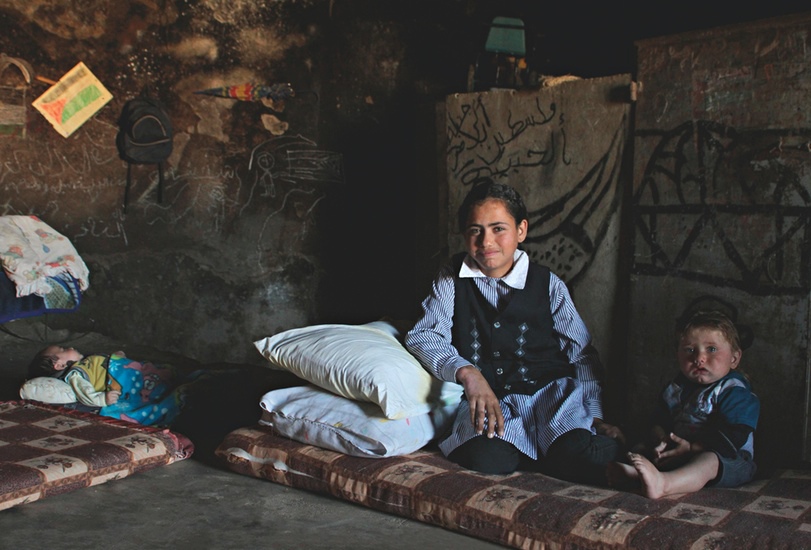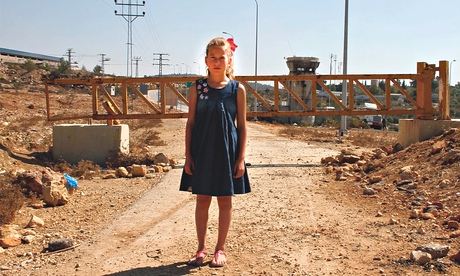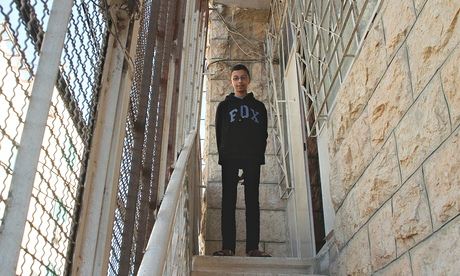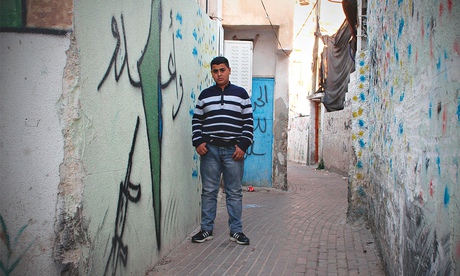Children of the occupation: growing up in Palestine
Feb 7 2014 / 6:24 pm
Nawal Jabarin wants to be a doctor when she grows up. For now, she lives in a cave with 14 siblings, in constant fear of military raids. We meet the Palestinian children living under Israeli occupation
By Harriet Sherwood.
The Guardian, 2/7/14 – The rough track is an unmarked turning across a primeval landscape of rock and sand under a vast cobalt sky. Our Jeep bounces between boulders and dust-covered gorse bushes before beginning a bone-jolting descent from the high ridge into a deep valley. An Israeli army camp comes into view, then the tiny village of Jinba: two buildings, a few tents, a scattering of animal pens. A pair of military helicopters clatter overhead. The air smells of sheep.
At the end of this track in the southern West Bank, 12-year-old Nawal Jabarin lives in a cave. She was born in the gloom beneath its low, jagged roof, as were two of her brothers, and her father a generation earlier. Along the rock-strewn track that connects Jinba to the nearest paved road, Nawal’s mother gave birth to another baby, unable to reach hospital in time; on the same stretch of flattened earth, Nawal’s father was beaten by Israeli settlers in front of the terrified child.
The cave and an adjacent tent are home to 18 people: Nawal’s father, his two wives and 15 children. The family‘s 200 sheep are penned outside. An ancient generator that runs on costly diesel provides power for a maximum of three hours a day. Water is fetched from village wells, or delivered by tractor at up to 20 times the cost of piped water. During the winter, bitter winds sweep across the desert landscape, slicing through the tent and forcing the whole family to crowd into the cave for warmth. “In winter, we are stacked on top of one another,” Nawal tells me.
She rarely leaves the village. “I used to ride in my father’s car. But the settlers stopped us. They beat my father before my eyes, cursing, using foul language. They took our things and threw them out of the car.”
Even home is not safe. “The soldiers come in [the cave] to search. I don’t know what they’re looking for,” she says. “Sometimes they open the pens and let the sheep out. In Ramadan, they came and took my brothers. I saw the soldiers beat them with the heel of their guns. They forced us to leave the cave.”
Despite the hardships of her life, Nawal is happy. “This is my homeland, this is where I want to be. It’s hard here, but I like my home and the land and the sheep.” But, she adds, “I will be even happier if we are allowed to stay.”
Nawal is one of a second generation of Palestinians to be born into occupation. Her birth came 34 years after Israel seized the West Bank,Gaza Strip and East Jerusalem during the six-day war. Military law was imposed on the Palestinian population, and soon afterwards Israel began to build colonies on occupied land under military protection. East Jerusalem was annexed in a move declared illegal under international law.
The first generation – Nawal’s parents and their peers – are now approaching middle age, their entire lives dominated by the daily grind and small humiliations of an occupied people. Around four million Palestinians have known nothing but an existence defined by checkpoints, demands for identity papers, night raids, detentions, house demolitions, displacement, verbal abuse, intimidation, physical attacks, imprisonment and violent death. It is a cruel mosaic: countless seemingly unrelated fragments that, when put together, build a picture of power and powerlessness. Yet, after 46 years, it has also become a kind of normality.
For the young, the impact of such an environment is often profound. Children are exposed to experiences that shape attitudes for a lifetime and, in some cases, have lasting psychological consequences. Frank Roni, a child protection specialist for Unicef, the United Nations’ agency for children, who works in the West Bank, Gaza and East Jerusalem, speaks of the “inter-generational trauma” of living under occupation. “The ongoing conflict, the deterioration of the economy and social environment, the increase in violence – this all impacts heavily on children,” he says. “Psychological walls” mirror physical barriers and checkpoints. “Children form a ghetto mentality and lose hope for the future, which fuels a cycle of despair,” Roni says.
But their experiences are inevitably uneven. Many children living in the major Palestinian cities, under a degree of self-government, rarely come into contact with settlers or soldiers, while such encounters are part of daily life for those in the 62% of the West Bank under full Israeli control, known as Area C. Children in Gaza live in a blockaded strip of land, often growing up in extreme economic hardship, and with direct and shocking experience of intense warfare. In East Jerusalem, a high proportion of Palestinian children grow up in impoverished ghettoes, encroached upon by expanding Israeli settlements or with extremist settlers taking over properties in their midst.
In the South Hebron Hills, the shepherds who have roamed the area for generations now live alongside ideologically and religiously driven Jews who claim an ancient biblical connection to the land and see the Palestinians as interlopers. They have built gated settlements on the hilltops, serviced with paved roads, electricity and running water, and protected by the army. The settlers and soldiers have brought fear to the cave-dwellers: violent attacks on the local Palestinian population are frequent, along with military raids and the constant threat of forcible removal from their land.
Nawal’s village is inside an area designated in the 1980s by the Israeli army as “Firing Zone 918” for military training. The army wants to clear out eight Palestinian communities on the grounds that it is unsafe for them to remain within a military training zone; they are not “permanent residents”. A legal battle over the fate of the villages, launched before Nawal was born, is still unresolved.
Her school, a basic three-room structure, is under a demolition order, as is the only other building in the village, the mosque, which is used as an overspill classroom. Both were constructed without official Israeli permits, which are hardly ever granted. Haytham Abu Sabha, Nawal’s teacher, says his pupils’ lives are “very hard. The children have no recreation. They lack the basic things in life: there is no electricity, high malnutrition, no playgrounds. When they get sick or are hurt, it’s hard getting them to hospital. We are forced to be primitive.”
The children are also forced to be brave. Nawal insists she is not afraid of the soldiers. But when I ask if she has cried during the raids on her home, she hesitates before nodding almost imperceptibly, unwilling to admit to her fears. Psychologists and counsellors working with Palestinian children say this reluctance to acknowledge and vocalise frightening experiences compounds the damage caused by the event itself. “Children say they are not afraid of soldiers, but their body language tells you something different,” says Mona Zaghrout, head of counselling at the YMCA in Beit Sahour, near Bethlehem. “They feel ashamed to say they are afraid.”

Ahed Tamimi, 12, plays hopscotch, likes movies about mermaids and teases her brothers at home in Nabi Saleh. Photograph: Quique Kierszenbaum for the Guardian
Like Nawal, 12-year-old Ahed Tamimi boldly asserts that she, too, has no fear of soldiers, before quietly admitting that sometimes she is afraid. Ahed’s apparent fearlessness catapulted her to a brief fame a year ago when a video of her angrily confronting Israeli soldiers was posted online. The girl was invited to Turkey, where she was hailed as a child hero.
Amid tree-covered hills almost three hours’ drive north of Jinba, Nabi Saleh is a village of around 500 people, most of whom share the family name of Tamimi. From Ahed’s home, the Israeli settlement of Halamish is visible across a valley. Founded in 1977, it is built partly on land confiscated from local Palestinian families. An Israeli army base is situated next to the settlement.
When settlers appropriated the village spring five years ago, the people of Nabi Saleh began weekly protests. Ahed’s parents, Bassem and Nariman, have been at the forefront of the demonstrations, which are largely nonviolent, although they often involve some stone-throwing. The Israeli military routinely respond with tear gas, stun grenades, rubber bullets, jets of foul-smelling fluid known as “skunk”, and sometimes live ammunition.
Two villagers have been killed, and around 350 – including large numbers of children – injured. Ahed was shot in the wrist by a rubber bullet. At least 140 people from Nabi Saleh have been detained or imprisoned as a result of protest activity, including 40 minors. Bassem has been jailed nine times – four times since his daughter’s birth – and was named a “prisoner of conscience” by Amnesty International; Nariman has been detained five times since the protests began; and Ahed’s older brother, Waed, was arrested. Her uncle, Rushdie Tamimi, died two days after being shot by soldiers in November 2012. An Israel Defense Forcesinvestigation later found that soldiers fired 80 bullets without justification; they also prevented villagers giving medical aid to the injured man.
Ahed, a slight, elfin-faced girl, is a discomforting mix of worldliness and naivety. For a child, she knows far too much about tear gas and rubber bullets, demolition orders and military raids. Her home, scarred by repeated army assaults, is one of 13 in the village that are threatened with being bulldozed. When I ask how often she has experienced the effects of tear gas, she laughs, saying she cannot count the times. I ask her to describe it. “I can’t breathe, my eyes hurt, it feels like I’m suffocating. Sometimes it’s 10 minutes until I can see again,” she says.
Like Nawal, Ahed is familiar with military raids on her home. One, while her father was in prison, began at 3am with the sound of assault rifles being battered against the front door. “I woke up, there were soldiers in my bedroom. My mum was screaming at the soldiers. They turned everything upside down, searching. They took our laptop and cameras and phones.”
According to Bassem, his daughter “sometimes wakes up at night, shouting and afraid. Most of the time, the children are nervous and stressed, and this affects their education. Their priorities change, they don’t see the point in learning.”
Those working with Palestinian children say this is a common reaction. “When you live under constant threat or fear of danger, your coping mechanisms deteriorate. Children are nearly always under stress, afraid to go to school, unable to concentrate,” Frank Roni says.
Mona Zaghrout of the YMCA lists typical responses to trauma among children: “Nightmares, lack of concentration, reluctance to go to school, clinginess, unwillingness to sleep alone, insomnia, aggressive behaviour, regressive behaviour, bed-wetting. Psychosomatic symptoms, such as a high fever without a biological reason, or a rash over the body. These are the most common things we see.”
The flip side of Ahed’s life is one of poignant prosaicness. She plays hopscotch and football with her schoolfriends, likes movies about mermaids, teases her brothers, skips with a rope in the sitting room. But she shrinks from the suggestion that we photograph her near the army watchtower at the entrance to the village, only reluctantly agreeing to a few minutes within sight of the soldier behind the concrete.
Her answers to questions about what the protests are over and the role of the army seem practised, the result of living in a highly politicised community. “We want to liberate Palestine, we want to live as free people, the soldiers are here to protect the settlers and prevent us reaching our land.” With her brothers, she watches a DVD of edited footage showing her parents being arrested, their faces contorted in anger and pain, her own confrontation with Israeli soldiers, a night-time raid on the house, her uncle writhing on the ground after being shot. On top of witnessing these events first-hand, she relives them over and over again on screen.
The settlers across the valley appear to her as completely alien. She has never had direct contact with any of them. No soldier, she says, has ever spoken a civil word to her.

Waleed Abu Aishe’s family put a steel cage over their house in Hebron after attacks by settlers: ‘It’s like living in a prison. No one can visit us. Soldiers are there day and night. I don’t remember anything else’. Photograph: Quique Kierszenbaum for the Guardian
It’s the same for 13-year-old Waleed Abu Aishe. Israeli soldiers are stationed at the end of his street in the volatile city of Hebron 24 hours a day, yet none has ever acknowledged the skinny, bespectacled boy by name as he makes his way home from school. “They make out they don’t know us, but of course they do,” he says. “They just want to make things difficult. They know my name, but they never use it.”
Nowhere in the West Bank do Israeli settlers and Palestinians live in closer proximity or with greater animosity than in Hebron. A few hundred biblically inspired Jews reside in the heart of the ancient city, protected by around 4,000 soldiers, amid a Palestinian population of 170,000. In 1997 the city was divided into H1, administered by the Palestinian Authority, and H2, a much smaller area around the old market, under the control of the Israeli military. H2 is now a near-ghost town: shuttered shops, empty houses, deserted streets, packs of wild dogs, and armed soldiers on most street corners. Here, the remaining Palestinian families endure an uneasy existence with their settler neighbours.
In Tel Rumeida, Waleed’s neighbourhood, almost all the Palestinian residents have left. Only the Abu Aishes and another family remain on his street, alongside new settler apartment blocks and portable buildings. Waleed lives much closer to his settler and soldier neighbours than either Ahed Tamimi or Nawal Jabarin: from his front window, you can see directly into settler homes a few metres away. Next door to his home is an army base housing around 400 soldiers.
Following violent attacks, stone-throwing, smashed windows and repeated harassment from settlers, the Abu Aishes erected a steel mesh cage and video cameras over the front of the three-storey house where the family has lived for 55 years. When not at school, Waleed spends almost all his time inside this cage. “For me, this is normal,” he says. “I got used to it. But it’s like living in a prison. No one can visit us. The soldiers stop people at the bottom of the street, and if they are not from our family, it’s forbidden for them to visit. There is only one way to our house, and the soldiers are there day and night. I don’t remember anything else: they have been here since I was born.” Despite his “normality”, he wishes his friends could come to the house, or that he and his brother could play football on the street.
The cage, and public condemnation that erupted in Israel following the broadcast on television of a Jewish woman hissing “whore” in Arabic through the mesh at female members of the Abu Aishe family, have reduced settler attacks and abuse. But Waleed still gets called “donkey” or “dog”, and is sometimes chased by settler children.
His mother, Ibtasan, says the soldiers take no action to protect her children. “They have got used to this way of life, but it’s very exhausting. Always I am worried,” she says as images from the street below flicker on a television monitor in the corner of the living room. “It was easier when they were little, although they had bad dreams. They would sleep one next to me, one next to my husband and one between us.”
A 2010 report by the children’s rights organisation Defence for Children International (DCI) said Palestinian children in Hebron were “frequently the targets of settler attacks in the form of physical assaults and stone-throwing that injure them” and were “especially vulnerable to settler attacks”.
I ask Waleed if he’s ever tempted to retaliate. He looks uncomfortable. “Some of my friends throw stones at the soldiers,” he says. “Even if I wanted to, I couldn’t, because the soldiers know me.”
Stone-throwing by Palestinian children at settlers and security forces is common, sometimes causing injuries and even deaths. Bassem Tamimi neither advocates nor condemns it: “If we throw stones, the soldiers shoot. But if we don’t throw stones, they shoot anyway. Stone-throwing is a reaction. You can’t be a victim all the time,” he says.

‘People respect me because I’ve been arrested so many times,’ says Muslim Odeh, 14, who lives in Silwan, East Jerusalem. Photograph: Quique Kierszenbaum for the Guardian
Another father, whose adolescent son has been detained by the Israeli police 16 times since the age of nine, concurs. “We have the right to defend ourselves, but what do we have to defend ourselves with? Do we have tanks, or jet fighters?” asks Mousa Odeh.
His son, Muslim, now 14, is well known to the Israeli security forces in the East Jerusalem district of Silwan. A few minutes’ drive from the five-star hotels around the ancient walls of Jerusalem’s Old City, Silwan is wedged in a gulley, a dense jumble of houses along steep and narrow streets lined with car repair workshops and tired grocery stores.
It has always been a tough neighbourhood, but an influx of hardline settlers has created acute tensions, exacerbated by the aggression of their private armed security guards and demolition orders against more than 80 Palestinian homes. The area’s youths throw stones and rocks at the settlers’ reinforced vehicles, risking arrest by the ever-present police.
“Every minute you see the police – up and down, up and down,” Muslim says. “They stop us, search us, bug us. When I’m bored, I bug them, too. Why should I be frightened of them?” The boy insists he is not among the stone-throwers, an assertion that stretches credulity. “The police accuse me of making trouble, but I don’t throw stones, ever. Some of my friends, maybe.”
Hyam, Muslim’s mother, says her son, the youngest of five children, has changed since the arrests began. “They have destroyed him psychologically. He’s more aggressive and nervous, hyper, always wanting to be out in the streets.”
Muslim’s detentions have followed a typical, well-documented pattern. Between 500 and 700 Palestinian children are arrested by Israeli security forces each year, most accused of throwing stones. They are often arrested at night, taken away from home without a parent or adult accompanying them, questioned without lawyers, held in cells before an appearance in court. Some are blindfolded or have their hands bound with plastic ties. Many report physical and verbal abuse, and say they make false confessions. According to DCI, which has taken hundreds of affidavits from minors in the West Bank and East Jerusalem, these children are often pumped for information on relatives and neighbours by their interrogators. Muslim has been held for periods varying from a few hours to a week.
For Muslim, his repeated detentions are a rite of passage. “People respect me because I’ve been arrested so many times,” he tells me. Child psychologists see it rather differently. They say young boys are often feted as heroes when they return from detention, which denies them the scope to process their traumatic experiences and express common feelings of acute anxiety. According to Zaghrout, boys are expected to act tough. “In our culture, it’s easier for girls to show fear and cry. Boys are told they shouldn’t cry. It’s hard for boys to say they are frightened to go to the toilet alone or that they want to sleep with their parents. But they still have these feelings, they just come out differently – in nightmares, bed-wetting, aggression.”
Mousa, Muslim’s father and the imam of the local mosque, says that, despite his son’s bravado, he is an unhappy and insecure boy. “When the army comes, he clings to me. Since the beginning of the arrests, he sleeps with me.” While Mousa is talking, Muslim suddenly leaves the house carrying a knife, intent on puncturing a football being kicked against the front wall by local children. “This is disturbed, irrational behaviour,” Mousa says. “This is because of the arrests. They have destroyed his childhood. He saw his father, his brother, his sister being arrested. There is a demolition order on the house. Most of our neighbours have been arrested. This is the childhood of this boy. He is not growing up in Disneyland.”
Mousa describes his own detention while trying to prevent the police arresting his son. “They carried me in my underwear from here to the Russian Compound [a cell and court complex in central Jerusalem]. Can you imagine more humiliation than this? We are religious people – we don’t even let our children see us without clothes. If you gave me a million dollars, I would not go outside in my underwear.”
The moment when children realise their parents, especially their fathers, cannot protect them is psychologically significant, according to experts. “For children, their fathers are the protectors of the family. But often these men reach a point where they cannot protect their children. Sometimes soldiers humiliate fathers in front of children. This is very difficult for children who naturally see their father as a hero,” Zaghrout says.
According to Roni at Unicef, “Children can lose faith and respect when they see their father beaten in front of them. These children sometimes develop a resistance to respecting people in authority. We hear parents saying, ‘I can’t control my child any more – they won’t listen to me.’ This creates great stresses within a family.”
Muslim now skips school regularly, saying it bores him, and instead spends his days roaming the streets. According to Mousa, the boy’s teachers say he is hard to control, aggressive and uncooperative. At the end of our visit, the restless teenager accompanies us back to our car. He bounces along the road, leaning in open car windows to twist a steering wheel or honk a horn. As we prepare to leave, he gives us a word of warning: “Be careful. Some kid might throw rocks at you.”
Despite their difficult lives, each of these four children has a touchstone of normality in their life. For Nawal, it is the sheep that she tends. Ahed likes football and playing with dolls. Waleed is passionate about drawing. Muslim looks after horses in his neighbourhood. And each has an ambition for the future: Nawal hopes to be a doctor, to care for the cave-dwellers and shepherds of the South Hebron Hills; Ahed wants to become a lawyer, to fight for Palestinian rights; Waleed aspires to be an architect, to design houses without cages; and Muslim enjoys fixing things and would like to be a car mechanic.
But growing up under occupation is shaping another generation of Palestinians. The professionals who work with these children say many traumatised youngsters become angry and hopeless adults, contributing to a cycle of despair and violence. “What we face in our childhood, and how we deal with it, forms us as adults,” Zaghrout says.
“There is a cycle of trauma imprinted on Palestinian consciousness, passed down from generation to generation,” Rita Giacaman, professor of public health at Birzeit university, says. “Despair is also handed down. It’s hard for children to see a future. The past not only informs the present, but also the future.”.

